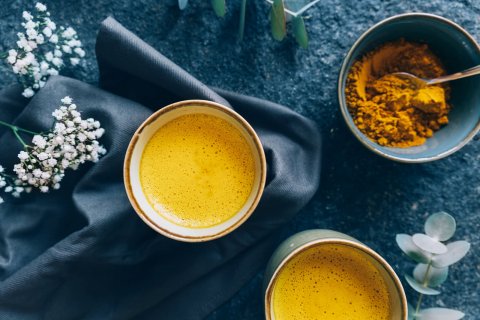Link to the turmeric tea picture here
Turmeric is an Indian spice from the ginger family, which means it is a root that is dried and ground into powder for our consumption. Its color varies from bright yellow to orange. It is often used as a medicinal herb and sometimes as a dye. It is the main ingredient of many curries and most of the world's turmeric is grown and also consumed in India.
The main benefits of turmeric include, but are certainly not limited to the following:
- It can reduce inflammation, and joint pain, and it is anti-microbial.
- It is a powerful antioxidant and can heal your gut with all the dietary fiber it has.
- It may reduce blood pressure. It is an anticoagulant and can replace medication if you suffer from a heart condition or thrombosis. The major positive side of this is that it's not addictive like chemicals are.
- It has anti-cancer effects as numerous studies show.
- It can be considered a brain food and it might protect against Alzheimer's disease.
- It helps boost the immune system and also your mood.
- 100 grams of the fresh turmeric root contains 23.9 mg of vitamin C. In its powder form, it still contains a lot of minerals like calcium, potassium, copper, zinc, and magnesium.
Detrimental effects of turmeric ingestion can be as follows:
- Make sure your turmeric is pure of additives, heavy metals, or coloring. Some commercial powders can contain wheat or barley which may badly affect people with celiac disease or gluten intolerance. If the powder contains metanil yellow or lead, which is a food colorant, consuming large amounts of turmeric might cause skin rashes or be toxic to the nervous system.
- Some people experience digestive issues such as bloating, flatulence, and diarrhea when consuming too much turmeric. In rare cases, some suffered from headaches and nausea or a skin rash.
- Turmeric contains a lot of oxalates. So if you suffer from gallbladder issues, avoid turmeric supplements. The same applies if you have kidney problems: the oxalate in the turmeric increases the risk of developing kidney stones.
- Pregnant women can consume turmeric as a spice in food but not in concentrated doses as a food supplement. To be avoided, especially if the woman is breastfeeding.
- Some studies show that some compounds in turmeric bind to iron. This could decrease the body's ability to absorb iron from food and lead to iron deficiency.
Bottom line, consume turmeric in moderation and under the supervision of a general practitioner or a herbalist to avoid any overdose. Small tip: combined with honey, turmeric is a natural and very powerful antibiotic! Bon appétit...

